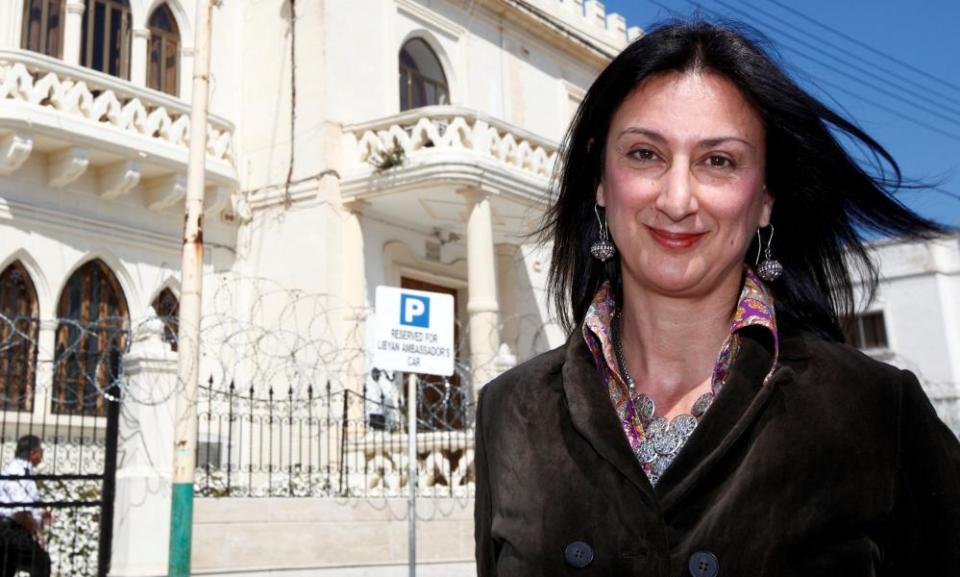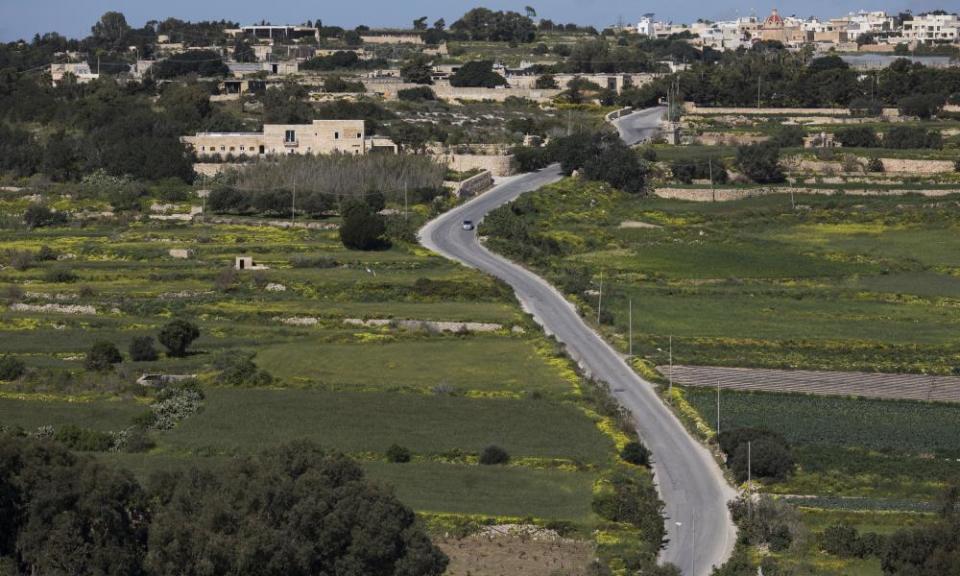EU politicians demand broader inquiry into Daphne Caruana Galizia murder

Politicians across Europe have demanded that Malta’s chief of police broaden the investigation into the killing of Daphne Caruana Galizia so that it pursues more aggressively those “with a motivation for silencing” the anti-corruption journalist.
Their intervention comes following Tuesday’s launch of the Daphne Project, a collaboration between international media organisations, including the Guardian, that came together in response to her murder and have pledged to continue her work.
The publication of a first wave of stories by the 18 media partners, including the New York Times, Le Monde and Südduetsche Zeitung, caused an uproar in Malta, and provoked widespread concern over the slow progress of the inquiry.
A fearless anti-corruption journalist, Daphne Caruana Galizia’s reporting came to international attention with her exposes in the 2016 Panama Papers project.
On 16 October the following year, the Maltese reporter was murdered by a bomb placed under the driver’s seat of her car.
The Daphne Project was created to continue her investigations. It is a collaboration of 18 media organisations in 15 different countries, including the Guardian, Reuters, Le Monde and the New York Times.
The project is the first to be led by Forbidden Stories, an international network of journalists who stand ready to take over when colleagues are silenced through imprisonment or murder.
The project will publish a series of fresh revelations, setting out the dangers that alleged political corruption and poor controls on money laundering inside Malta pose to law and order in Europe.
Describing the assassination of Caruana Galizia as horrifying, Dunja Mijatović, commissioner for human rights at the Council of Europe, said: “Six months after her killing, it does not appear that the Maltese authorities have made any tangible progress to identify the masterminds.”
The Portuguese MEP Ana Gomes, who led a parliamentary delegation to investigate the rule of law in Malta following Caruana Galizia’s assassination on 16 October, published a video message addressed directly to Lawrence Cutajar, Malta’s commissioner of police. She said the inquiry needed to look at people who had “a motivation for silencing Daphne”.
“Everyone knows that the police investigation needs to be widened to include suspected individuals who could have commissioned the assassination,” Gomes said.
Three men are in custody and awaiting trial for planting and triggering the car bomb that killed the journalist near her home in northern Malta. The suspects, George and Alfred Degiorgio and their associate Vincent Muscat, have pleaded not guilty. Police are still hunting whoever may have commissioned the attack.
Among a series of other developments:
Some supporters of Malta’s ruling Labour party rounded on Caruana Galizia’s husband and three sons, with a call for citizens to march in protest at their “provocation”. The family have claimed that elements in government are hampering the police investigation.
The magisterial inquiry into the murder case made a surprise on-site inspection in the northern village of Bidnija, where the journalist was killed. The three accused men, accompanied by armed officers and lawyers, looked on as the magistrate was shown key locations by the officer leading the homicide inquiry.
The European commission president, Jean-Claude Juncker, came under fire from an influential MEP for his allegedly “intimate” relationship with Malta’s prime minister, which he said had in effect given the country licence to act with impunity.
The opposition MP and former leader of Malta’s opposition, Simon Busuttil, was targeted by police, who summoned him for questioning after he allegedly allowed his personal car to be used to carry political posters.
Caruana Galizia ran a popular political blog in which she took on businessmen and politicians from both of Malta’s leading parties. By the time of her death, she was defending 47 individual libel suits.
In an interview 10 days before her death, published on Tuesday by the Daphne Project, Caruana Galizia detailed decades of politically motivated threats and harassment. These included an arson attack on her home, attacks in the media and the freezing of her bank accounts. A recording of the interview has been sent to the EU justice commissioner, Věra Jourová.
“Why are the Maltese police authorities not considering this interview as a lead in the investigations?” Gomes asked in her video address. “I request, Mr Commissioner, that the recording of this interview be preserved and be followed as a lead in the police investigations.”
Sophia in ’t Veld, the Dutch MEP and deputy leader of the liberal group in the European parliament, added: “There is still deep concern across Europe about the tragic murder of Daphne Caruana Galizia. I’m personally horrified by reports that the investigation may be being hampered and justice denied to her family members.
“We need reassurance that the government of Malta really wants to get to the bottom of who was responsible for ordering Daphne’s assassination. If we have to raise this issue again in the European parliament and elsewhere, we won’t hesitate to do so.”
As political tensions within Malta escalated, Busuttil tweeted that he had been summoned to appear at Valletta police headquarters at 3pm on Thursday. He is to face questions about the use of his car while posters were put up to mark the six-month anniversary of Caruana Galizia’s murder. Speaking to the Guardian, he described the action against him as “beyond Orwellian”, adding that it was “straight out of a police state”.
Juncker came under fire from one influential MEP for an allegedly “intimate” relationship with Joseph Muscat, which the parliamentarian said had in effect given Malta a “blank cheque” to act as it pleased. Sven Giegold, a German MEP and frequent critic of the Maltese government, said: “There is a systematic problem of a breach in the rule of law and this is being covered up by the commission. Even after the death of Daphne it is still being covered up, and I find that outrageous.”
A European commission spokesperson did not respond directly to personal criticism of Juncker but rejected suggestions of covering up violations of the rule of law in Malta. “The commission expects an independent and thorough investigation of Daphne Caruana Galizia’s murder. We have made this point at all levels, with different interlocutors, and our position is known and allegations that claim differently are simply false,” the spokesperson said.
“We urge the responsible authorities to continue the ongoing investigation up and until the persons responsible for this crime have been found and justice is served.”

For security reasons, Caruana Galizia’s sons have been advised to stay away from Malta. All three live and work abroad. Their father remains at the family home in Bidnija, where he is under 24-hour police guard.
In Bidnija on Wednesday, the three accused were led to the scene of the crime. With their hands cuffed, they followed proceedings as Insp Keith Arnaud of the Malta homicide squad accompanied the magistrate to the ridge of a hill.
Investigators allege that the former gun battery, which has clear views of Caruana Galizia’s home and the road below it, was used as a lookout point by Alfred Degiorgio in the weeks preceding the attack.
Arnaud has given evidence that he collected a fresh cigarette butt from the scene just after the bombing, and that lab tests found traces of Alfred Degiorgio’s DNA.
The magistrate, Claire Stafrace Zammit, has ruled that there was enough evidence for the three to stand trial but has not made a decision on whether an application for bail should be granted.

 Yahoo News
Yahoo News 